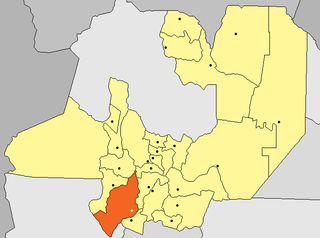
Jujuy is a province of Argentina, located in the extreme northwest of the country, at the borders with Chile and Bolivia. The only neighbouring Argentine province is Salta to the east and south.

Salta is a province of Argentina, located in the northwest of the country. Neighboring provinces are from the east clockwise Formosa, Chaco, Santiago del Estero, Tucumán and Catamarca. It also surrounds Jujuy. To the north it borders Bolivia and Paraguay and to the west lies Chile.

Santiago del Estero, also known simply as Santiago, is a province in the north of Argentina. Neighbouring provinces, clockwise from the north, are Salta, Chaco, Santa Fe, Córdoba, Catamarca and Tucumán.
Postal codes in Argentina are called códigos postales. Until 1998 Argentina employed a four-digit postal code for each municipality, with the first digit representing a region in the country, except in the case of the city of Buenos Aires. The unique codes became the base for the newer system, officially called CPA.

National Route 9 is a major road in Argentina, which runs from the center-east to the northwest of the country, crossing the provinces of Buenos Aires, Santa Fe, Córdoba, Santiago del Estero, Tucumán, Salta and Jujuy. It starts on Avenida General Paz, which marks the border between the Autonomous City of Buenos Aires and the surrounding province of the same name, and ends at the Horacio Guzmán International Bridge, on the La Quiaca River, traversing 1,967 km (1,222 mi). The road is a limited access motorway from Buenos Aires to Rosario.
Cacán is an extinct language that was spoken by the Diaguita and Calchaquí tribes in northern Argentina and Chile. It became extinct during the late 17th century or early 18th century. The language was documented by the Jesuit Alonso de Bárcena, but the manuscript is lost. Genetic affiliation of the language remains unclear, and due to the extremely limited number of known words, it has not been possible to conclusively link it to any existing language family.
San José or San Jose most often refers to:

Capital is a department located in Salta Province, Argentina. It is the department of the provincial capital, the city of Salta, and the most populated one.

Rosario de Lerma is a department located in Salta Province, Argentina. Its main settlements are Rosario de Lerma and Campo Quijano.

Los Andes is a department located in Salta Province, Argentina. It is the second largest by area in the province, after Rivadavia Department, and its capital is the town of San Antonio de los Cobres.

La Poma is a department located in Salta Province, Argentina. It is the least populated department of the province and its capital is the town of La Poma.

The Salta–Antofagasta railway, also named Huaytiquina, is a non-electrified single track railway line that links Argentina and Chile passing through the Andes. It is a 1,000 mmmetre gauge railway with a total length of 941 km, connecting the city of Salta (Argentina) to the one of Antofagasta (Chile), on the Pacific Ocean, passing through the Puna de Atacama and Atacama Desert.

La Viña is a department located in Salta Province, in northwestern Argentina.

San Carlos is a department located in Salta Province, in Argentina.

Metán is a department located in Salta Province, in Argentina.

Nevado de Acay is a 5,950-metre-high (19,520 ft) mountain in Argentina. It is a volcanic intrusion that formed during the Miocene and was later exposed. The intrusion is formed by monzonite and is associated with a fault system that also connects to neighbouring volcanoes.

The Salta Identity Party is a provincial political party in the Salta Province of Argentina. It was founded by Gustavo Sáenz ahead of the 2015 general election; Sáenz has been governor of Salta since 2019.

Gustavo Adolfo Ruberto Sáenz Stiro is an Argentine politician who is currently governor of Salta Province, since 10 December 2019. Previously, from 2015 to 2019, he was intendente (mayor) of the City of Salta, and served from 2009 to 2013 as a member of the Provincial Senate representing the Capital Department.















